First published on Substack
************************
I propose a new sociopolitical model that I call Voluntary Democracy. You may reasonably ask how I became arrogant enough to even contemplate doing such a thing.
I am no one or everyone, depending on your perspective. I am a very average bloke with some limited life experience, a modicum of knowledge, and sufficient interest to talk and write about the topic we are about to discuss.
I do not profess to have all the answers or even know what most of the questions are. I am just about as flaky as it is possible for a man to be and am undeserving of your trust which is among the reasons I ask you not to place any in me.
I am merely proposing an idea. My only hope is that you consider it. If I’m lucky perhaps you will question it and, if I’m very fortunate, start expanding on it.
We are going discuss some of the problems with representative democracy which is the political model of state preferred by most people I will refer to a statists. I’ll call this model simply the state.
I was born and live in the the state called the United Kingdom (UK). Nobody ever asked me if I wanted to be ruled by a king or his government, but that is the nature of the state. It’s not a choice to be a subject of the state. Though statists claim it is.
Therefore, I will use the current alleged constitutional monarchy, the claimed basis for the UK state, as my test case.
What Democracy Is and What It Is Not
Democracy is a political system first formally established in ancient Greece by Cleisthenes (c. 570–500 BCE). Cleisthenes introduced “sortition”—which is the random selection of citizens drawn by lot. Under his reforms, the Boule (executive) proposed legislation, and the Ecclesia (legislature) would then debate the proposed statute laws and vote on their enactment.
The citizen members of the Boule and the Ecclesia were selected by sortition. Once their work was done, the Boule and the Ecclesia were disbanded. The people would return to their everyday lives. The next time the Boule and the Ecclesia were needed, sortition would again be used and a different group of people selected.
Sortition was also used to form juries, whose citizen members sat in the Dikasteria (courts). The jury in the Dikasteria represented the highest law in the land. Any Dikasteria could overturn the enactments of the Ecclesia. This political system enabled the people to create legislation (statute law) as well as law derived from precedent (case law).
Crucially, Cleisthenes empowered the Dikasteria (the law courts) to overrule (annul) any law that was found to be unjust in a jury-led trial. There were no judges. Magistrates were merely administrators for the court. If the defendant was found guilty, both the judgement (ruling) and the nature of the punishment (sentence) were decided by the citizen jurors.
If the full application of the law (including legislation) did not serve justice, the jury could annul it. The defendant may have technically contravened the law but could still be found not guilty if the jury believed the defendant had acted honourably, without any intent to cause harm or loss (mens rea).
In such a circumstance, it was the law, not the accused, that would be found at fault. Any flawed legislation would be wiped from the statute scrolls and the Boule and the Ecclesia would have to amend or abolish it in light of the Dikasteria’s ruling.
The word “democracy” (demokratia) derives from “demos” (people) and “kratos” (power). Literally translated, it means “people power.” Cleisthenes proposed a governance system whereby the people were sovereign by virtue of exercising the rule of law through jury-led trials. This, and only this, is “democracy” and it has nothing to do with voting or electing anyone.
So-called “representative democracy” is not democracy. In representative democracies the people are permitted to select representatives who make all decisions for them for the next few years. During their rule, the representatives enforce their collective will upon the people.
Representative democracy is based upon the people handing all their decision making power over to a tiny clique of privileged rulers. It is the antithesis of democracy.
We are allowed to elect the legislature, which we call Parliament (Ecclesia). The dominant faction, usually formed from the most popular mob—chosen by those who bothered to vote—then forms the executive. We call this the government (Boule).
Depending on how dominant the ruling mob is—determined by their relative number of parliamentary seats—the executive (Boule or government) can either easily compel the legislature (Ecclesia) to adopt its desired policies (legislation) or engage in some horsetrading with their “opposition” to amend their legislation (policy diktat) prior to its almost inevitable adoption. “Opposition” is a misleading term because the people who actually rule control both the government and the so-called opposition.
The current British government, despite only securing votes from a small minority of the population, enjoys a massive parliamentary majority. The government (Boule) can “whip” its own representative members of Parliament (MP’s) to push through pretty much any policy it likes without bothering to consult anybody.
In the UK’s representative democracy, while statists think they are electing people who will represent their views and prioritise addressing their concerns, Parliament declares itself sovereign over all of the people. Statists actually select their own rulers—of sorts.
Parliament’s claim to sovereignty is false. The British have a codified, written constitution that makes the people sovereign. That doesn’t matter, however, to government as long as the population continues to assume Parliament’s claim is valid.
The advantage of “representative democracy,” from the perspective of the oligarchs who actually rule, is that it allows them to rule in perpetuity. Through lobbying, political party and campaign funding, government partnerships, corruption, coercion and orders issued to puppet MP’s, the vast bulk of parliamentarians represent only oligarchs’ views and prioritise oligarchs’ concerns. Oligarchs aren’t overly concerned about who wins elections.
In the UK’s representative democracy the courts (Dikestaria) are led by the Judiciary. As a Common Law jurisdiction, juries in the UK can still technically “annul” legislation. The judiciary “instructs” juries but never informs them they can annul. Consequently, British juries remain oblivious of their own rights and powers. The judiciary really doesn’t like jury trials in any event, and is working with the government to do away with them if they can.
The state supposedly operates on the comically misnamed separation of powers model. Everyone who lives and works in the UK knows this is total bunk.
The three branches of government comprise of the executive (government or Boule) and the legislature (Parliament or Ecclesia) which together form a single, oligarch controlled rule-making institution. The third branch, the judiciary (courts or Dikesteria), forces the people to comply with the rules and punishes those who don’t. It rarely, if ever, rules against the oligarchs’ rule-making institution and is completely divorced from anything the rest of us might consider justice. The only people who don’t have to obey dictatorial rule are the oligarchs who are above all the rules they impose on everyone else, often because they can buy themselves out of having to comply with any.
This, then, is the state.
Introducing Voluntary Democracy
The problem with “representative democracies” is that they always resolve in kakistocracies ruled by oligarchs. In other words, dictatorships. The people are merely given the illusion of choice through anointment ceremonies called elections where they are invited to crown the next gaggle of kakistocrats who will rule them on behalf of the oligarchs.
I suggest the solution to this is Voluntary Democracy.
Voluntary democracy wouldn’t necessitate reinventing the wheel. The three branches of governance would remain and the process of proposing, enacting, and ruling on legislation would continue.
The executive would be replaced with a body formed of citizens who would be randomly selected by sortition from the whole population and would serve on a temporary or perhaps issue by issue basis. We could call this the Boule or something else. How about “voluntary-executive” perhaps? Let’s use “the Volexec.”
The legislature would be a larger body—selected and serving in the same way—who would then deliberate on and enact legislation proposed by the executive. Again, we could stick with Ecclesia, but let’s use “the Volegis.”
The biggest procedural difference in a voluntary democracy, other than the selection process, would be the abolition of bench trials. All justice would be dispensed by jurors in jury led trials and judges would be replaced by conveners whose only role would be to facilitate proceedings.
The most important difference would be that all juries would be sovereign. Juries and only juries would represent the supreme rule of law in the whole jurisdiction and their only concern would be to ensure justice was served. We shall call these voluntary Dikasteria “the Volcourts.”
Through jury-led trials, these sortition selected groups of citizens—jurors— sitting in Volcourts across the land, would have the united and annexed power to annul any and all legislation and set case precedents wherever they deemed it necessary. In the event of annulment, the Volexec and the Volegis would need to either amend or abolish the faulty legislation accordingly.
There would be no government and no resultant state in a voluntary democracy. Voluntary societies would be jurisdictions without rulers, not jurisdictions without rules. Nor would voluntary democracy necessitate the existence of nations, though people could form them voluntarily and call themselves whatever they liked. Therefore, as we proceed to Part 2 and move away from the UK based example to broader considerations, I won’t reference the concept of nations but rather use “jurisdictions.”
Voluntary democratic jurisdiction won’t be perfect and they won’t solve all our problems. Nonetheless, I think they could resolve many of the injustices we currently suffer. Not least of all by effectively removing oligarchs’ political power.
To realise the promise of a voluntary democracy we would all need to work through a major philosophical shift. Our fundamental belief and value systems would need to change. For example, obedience would no longer be a virtue but rather a failing. Initially, individuals would have to start by learning to think differently. Ultimately, if we wanted to operate voluntary democracies at the macro scale, all of us would need to develop and adopt a new political philosophy. Statists, who form the majority, all currently share essentially one political philosophy so there is no reason why voluntaryists couldn’t do the same and become the majority themselves. We’ll expand on this in Part 3.
So I hope some will be sufficiently intrigued to read Part 2. If not, thanks for voluntarily reading this article.

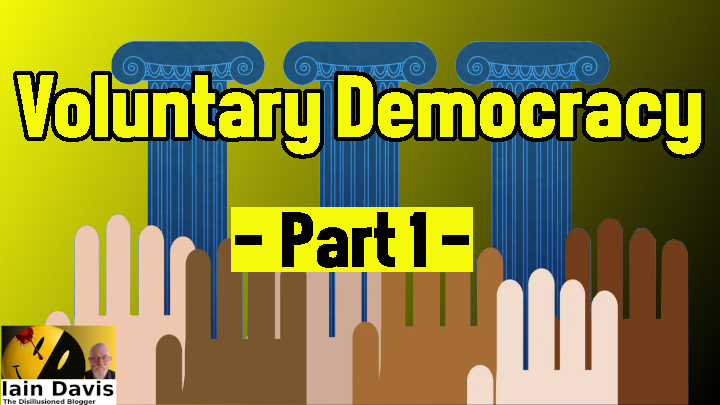

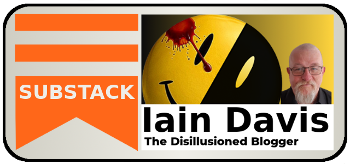

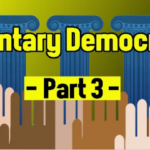
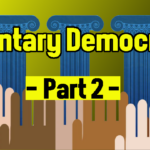
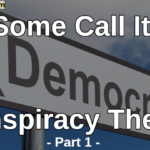
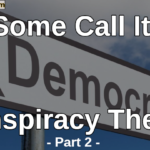
Be the first to comment on "Voluntary Democracy – Part 1"